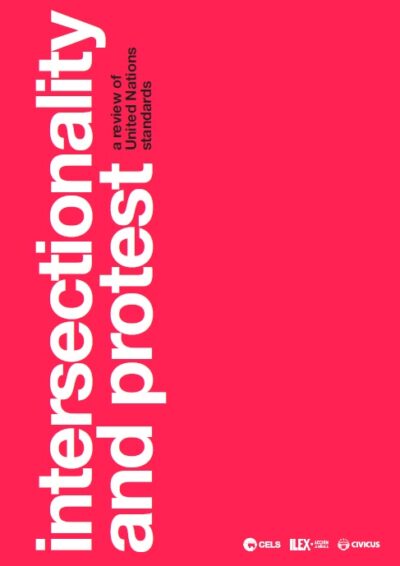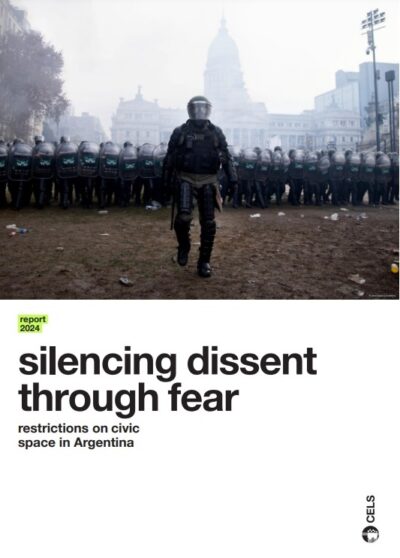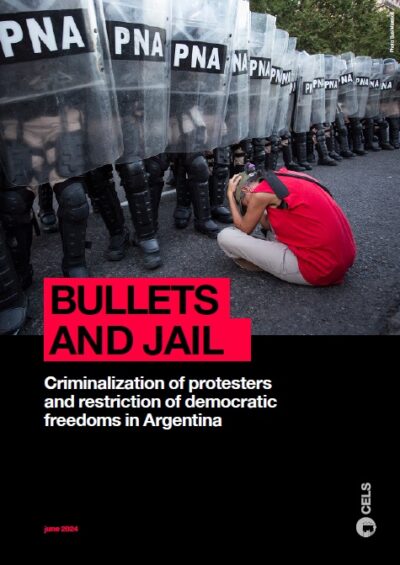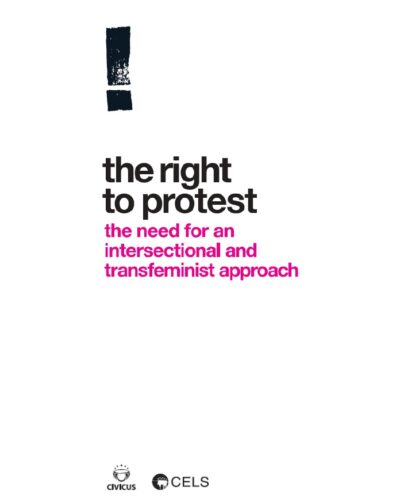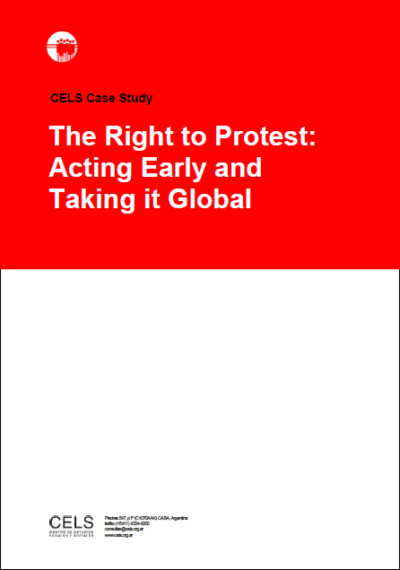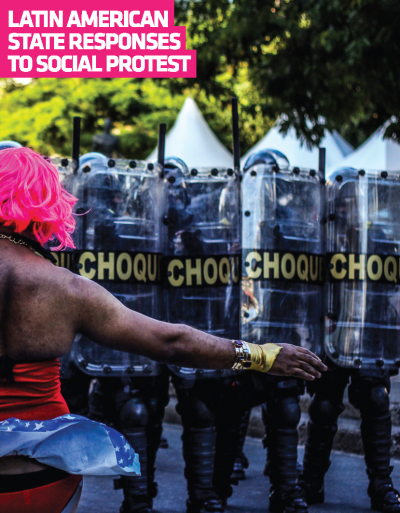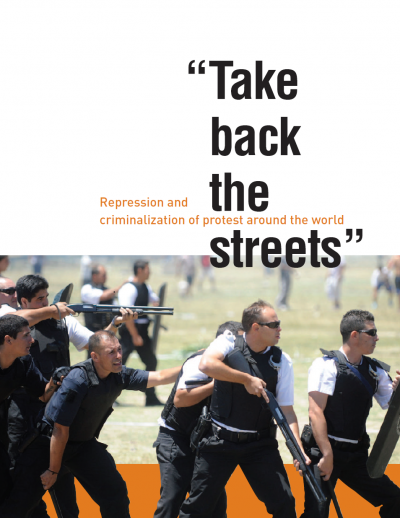Intersectionality and protest
Autor/a: CELS, ILEX, CIVICUS
16 pages
ver más
Julio García Romero vs. Ecuador: CELS and RFK Human Rights appear as amicus curiae before the Inter-American Court of Human Rights
The case was heard in a public hearing nearly 20 years after the Chilean journalist’s death, caused by tear gas used by Ecuadorian police during a protest crackdown.
Silencing dissent through fear. Restrictions on civic space in Argentina
Autor/a: CELS
10 pages
ver más
Venezuela: we demand transparency in elections, political dialogue, and guarantees for protests
Human rights organizations call on Venezuelan authorities to respect the rights to protest and freedom of expression. It is essential to find peaceful solutions to the crisis that strengthen democracy in the region.
Venezuela presidential election: international organizations call on authorities to guarantee transparency
On July 28, Venezuelans participated massively and peacefully in the presidential elections, demonstrating an inspiring commitment to democratic principles. This occurred despite the fact that the electoral process was severely marred by human rights violations and irregularities. The undersigned international organizations condemn the lack of transparency in the announced results.
The Government reaffirmed its policy of criminalizing protests and defended its use of repression before the IACHR
During a public hearing requested by human rights, labor, and social organizations, representatives from the Inter-American Commission on Human Rights (IACHR) and the United Nations expressed their concerns about the use of force, arbitrary detentions, the Ministry of Security’s protocol, and the stigmatization of demonstrators and social organizations.
Bullets and jail: Criminalization of protesters and restriction of democratic freedoms in Argentina
Autor/a: CELS
14 pages
ver más
Six Months of Javier Milei’s Government in Argentina: Shock Doctrine and Libertarian Authoritarianism
On a new tour in Europe, President Javier Milei will visit Hamburg and Berlin this weekend. Together with the German organization Misereor, we are publishing this report in Spanish and German on the concrete risks to human rights posed by the measures of the La Libertad Avanza government.
Milei’s administration in Argentina: A brief overview of South America’s leading far-right figure visiting Germany
Published in German on the Heinrich Böll Stiftung website.
We denounced the restrictions on the right to protest before the IACHR and the UN: detentions combined with an arbitrary and dangerous escalation of punitive measures
This came after the repression of thislast week’s protest against the “Bases and Starting Points for the Freedom of Argentines” Bill in Congress. More than 30 people were arbitrarily detained and later accused by the prosecution of serious crimes against democratic order, echoing the government’s accusations of terrorism and an attempt to overthrow the government.
UN urges government to review the omnibus bill and protocol, saying they criminalize protest
The special rapporteurs expressed their concern over the Ministry of Security resolution and proposed legal reforms criminalizing protest. They called on the Argentine State to comply with international human rights standards.
With more than 1,700 signatures from organizations, we condemn the protocol against protest before the UN and the IACHR
Jointly with trade unions, social movements, human rights organizations, and entities focused on social, trade, environmental, indigenous, migrant, transfeminist, religious, children’s, student, and political causes, we have requested international mechanisms to demand the Argentine State stop the implementation of new regulations that seek to restrict and repress public protest. These submissions were also supported by 15,000 individual signatures.
We denounced before the IACHR the increase in indiscriminate use of less lethal weapons to suppress protests
With over 20 international and regional organizations we questioned the irregular and disproportionate use of these weapons by security forces and their serious consequences on health and human rights of people who exercise their right to protest.
Protests and escalation of state violence in the Argentine province of Jujuy
Mass mobilizations to protest for higher wages were further heightened by demonstrations against the constitutional reform proposed by the government of Jujuy. The government responded by quashing the demonstrations and criminalizing protesters, resulting in dozens of injured and arbitrary arrests. This new constitution passed in record time restricts the enjoyment of human rights and seeks to avoid social demonstration against the active expansion of mineral extractivism.
2023: shaping the future of democracy with human rights
Celebrations and debates will mark the 40th anniversary of Argentina’s democracy on December 10. From CELS, we are proposing content and spaces for participation to foster the collective momentum to navigate the challenges we are facing today.
The right to protest: the need for an intersectional and transfeminist approach
Autor/a: Luciana Pol (general coordination) Cynthia Palacios Reckziegel and Lucía Morale (fieldwork, reaserch coordination, and text)
42 pgs.
ver más
UN universal periodic review: What is Argentina’s human rights situation?
Argentina will be reviewed in the United Nations Human Rights Council on Monday, January 23. It will have to report to its peers on compliance with its international commitments on human rights matters. CELS, along with other organizations, produced reports as prior contributions for the assessment and recommendations to be produced by this mechanism. We will also be present at the session in Geneva.
Indigenous peoples: the state fails to meet its commitments and backslides in response to racist pressure
Despite having the right to ownership and possession of their ancestral territories, this right is not enforced nor are there policies in place to guarantee that Indigenous people can live out their lives in keeping with their identity. The progress made in recent decades has not been sufficient. State response is often couched in rhetoric and stigmatizing stereotypes. The growing number of complaints is linked to this historic debt.
Right to protest: meeting of Latin American organizations
On July 25-27 we held an event in Buenos Aires to debate current reality in our region with colleagues from Brazil, Colombia, Chile, Honduras, Ecuador and Mexico.
Rejection of Bolsonaro’s threat to put an end to activism in Brazil
Nearly 3,000 national and international NGOs, collectives and social movements rejected presidential candidate Jair Bolsonaro’s remark indicating that, if elected, he would “end all activism in Brazil.” We explain the reasons why this represents a threat to democracy in the following statement of repudiation.
Pressure increasing on Argentine civil society, a vital force for change
Argentina is consolidating rollbacks in some key areas of social contestation, with cases of violent police responses to public assemblies, increased judicial persecution of activists and organisers, and a political discourse supporting them both.
Grave human rights crisis in Nicaragua
The repression of social protest carried out by Nicaraguan security forces and para-police groups has left at least 273 people dead and 1800 injured in the last three months. What started with demonstrations against a pension reform has ballooned into a human rights crisis.
Defending Dissent: Report launch at the UN Human Rights Council
Joint research by the International Network of Civil Liberties Organizations (INCLO) and the International Human Rights Clinic of the University of Chicago Law School (IHRC) offers practical guidance on how law enforcement can protect human rights when policing protests.
UN Human Rights Council urged to investigate violence in Palestine
“Enough is Enough”: 95 civil society organizations call on the UN Human Rights Council to urgently launch a Commission of Inquiry to investigate violence against protesters in Palestine.
Protest, social movements and state crackdowns
A fresh round of content published on our Right to Protest platform covers ground across the world: from Kenya, Hungary and Australia to Peru, Canada and Argentina. The threats to this fundamental right can be seen on the street, with violent repressions, and in terms of state surveillance and judicial persecution. This online project was developed by openDemocracy, CELS and INCLO, with support from the ACLU.
The right to protest is in danger
A violent and intimidating police operation. Arbitrary detentions. Federal criminal charges. Political support for police violence. No specific legal framework for regulating the intervention of federal security forces in protests. Threats by political authorities, violent actions by security forces and their judicial validation – all of these are ways of limiting the right to protest.
The Argentine state will be evaluated at the UN
National organizations presented their assessments for the Universal Periodic Review (UPR), a peer evaluation of the human rights situation in each of the UN’s 193 member states. Argentina will be evaluated in early November.
The Right to Protest worldwide
We are unveiling an online platform that brings together original articles, videos and interviews on the right to protest, at a time when demonstrations are proliferating worldwide and states often respond with violence. This project was developed by openDemocracy, CELS and INCLO, with support from the ACLU.
Human rights crisis in Venezuela
The Venezuelan government did not protect the right to life and restricted the rights to freedom of expression, of assembly and of political participation. The United States government imposed new legal and financial sanctions on the country. The situation requires the international community’s active commitment to support Venezuela in finding a sovereign way out of the crisis.
Fuentealba: amicus brief submitted to Argentina’s Supreme Court
The amicus brief submitted by CELS calls on the Supreme Court to bear in mind that Carlos Fuentealba’s death occurred during a protest and that it is the state’s duty to guarantee the free exercise of this right.
Surveillance and the use of “less lethal” weapons during protests
Michael Power of South Africa’s Legal Resources Centre, Homer Venters from Physicians for Human Rights, and Matthew Cagle from the American Civil Liberties Union share reflections on state responses to social protest.
The Right to Protest: Acting Early and Taking it Global
Autor/a: CELS
5 pgs.
ver más
Latin American State Responses to Social Protest
Autor/a: CELS
62 pgs.
ver más
Milagro Sala: One year of arbitrary detention
Joint press release by CELS, Amnistía Internacional and ANDHES.
Milagro Sala conviction: a dangerous precedent for the exercise of the right to protest in Argentina
Based on testimony lacking any credibility, the federal judiciary handed down a disproportionate sentence to a social activist for an episode in which she did not participate.
United Nations requests immediate release of Milagro Sala, a prominent Argentine social leader
Joint press release by Amnistía Internacional Argentina, CELS and ANDHES.
Police officer shoots a protester in Neuquén province
A police officer shot a union delegate with lead bullets during a protest outside the Labor Ministry of Neuquén province.
What Obama Should Know About Macri’s Argentina
Milagro Sala’s arbitrary detention occurs in the context of multiple measures taken by the Macri administration that have weakened the rule of law on the pretext of security, economic freedom and the “war on drugs.” By Gastón Chillier and Ernesto Semán.
The detention of Milagro Sala: Human rights organizations seek precautionary measures from the IACHR
Argentine social activist Milagro Sala stands accused of inciting the crime of obstructing traffic in relation to a protest she helped organize, and of sedition for resisting a provincial measure related to the work of cooperatives in which she participates.
Take Back the Streets: Repression and Criminalization of Protest around the World
Autor/a: ACLU, ACRI, CCLA, IEPR, HCLU, KHRC and Liberty
69 pgs.
ver más


